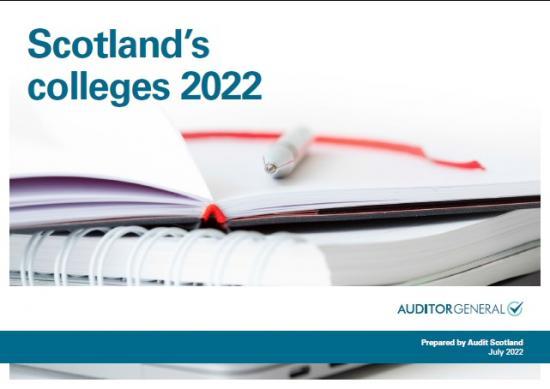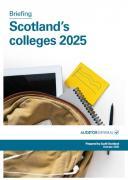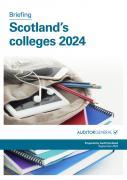Change Needed To Overcome Colleges' Challenges - Financial and Students Drop Out Rate
7th July 2022

Scotland's colleges responded well to Covid-19, but changes are needed to ensure they are financially sustainable in the long term and more students graduate.
Covid-19 funding contributed to a better-than-expected end of year operating position for the sector in 2020-21. However, colleges' finances are forecast to deteriorate.
Colleges responded well to the shift to online learning during the pandemic. But the proportion of students successfully completing their course has fallen. On average, socially disadvantaged and vulnerable students are less likely to successfully complete their course than their peers.
Wide-ranging recommendations to improve the college sector were made by the Scottish Funding Council (SFC) in 2021, including multi-year funding assumptions. They were broadly accepted by the Scottish Government, which is due to set out the future role of the college and university sectors in 2023. In the meantime, it is important that the government and the SFC support colleges to plan for change.
Stephen Boyle, Auditor General for Scotland, said, "The challenging financial situation facing colleges will make it difficult for the sector to balance the delivery of high-quality courses and Scottish Government priorities.
Changes are needed to ensure the sector is financially sustainable in the long-term and more students successfully complete their courses.
Colleges need support to plan for those changes, and the Scottish Government needs to work with the SFC to put its plan into action at the earliest opportunity.
KEY MESSAGES
1 Covid‑19 funding contributed to the college sector reporting a healthier than expected financial position in 2020-21. This is forecast to change for the current and next academic years. It will be difficult for Scotland's colleges to balance the delivery of high-quality learning at the volume currently expected and to contribute to other Scottish Government priorities while remaining financially sustainable.
2 Colleges have continued to deliver learning in unprecedented circumstances and responded well to the shift to online learning during the Covid‑19 pandemic. However, the proportion of students successfully completing their course and achieving their intended qualification has fallen. And on average, socially disadvantaged and vulnerable students were less likely to successfully complete their course than their peers. High rates of student withdrawals may affect the life chances of individual students, impact on wider society, and risk not maximising public investment in the college sector.
3 Change is needed to ensure more students are successful and that the college sector is financially sustainable in the long term. Wide-ranging recommendations for change made by the Scottish
Funding Council (SFC) in 2021 need to be implemented at the earliest opportunity. The Scottish Government is due to set out the future role of the college and university sectors in 2023, but it is
important that the Scottish Government and the SFC support colleges to plan for change now to make best use of available funding.
Colleges face difficult decisions to achieve financial sustainability
6. Colleges face a challenge in balancing the delivery of high-quality learning at the volume currently expected with the financial decisions required to remain financially sustainable in the longer term. To balance their budgets, incorporated colleges are striving to increase non-SFC income and reduce costs. Auditors found that around half are considering or likely to consider reducing staff in 2021-22 to deliver savings. This has potential implications for the delivery of learning, student outcomes and the experience of remaining staff. It also heightens the risk of further industrial action within the sector.
7. In the context of growing financial challenges and uncertainties, medium-term financial planning based on as much information as possible is more important than ever. In May 2022, the Scottish Government announced its multi-year spending plans up to 2026/27. This shows a flat cash settlement for the SFC over the next four years, equating to an eight per cent reduction in real terms. The multi-year plan confirms that the college sector faces some really challenging years to come.
Successful course completion
FE Students: 61.3% full-time | 76.3% part-time
HE Students: 72.1% full-time | 81.3% part-time
successfully completed their course.
Student withdrawals
Full-time students: 27.7% FE | 17.7% HE
failed to complete their courses.
Withdrawal rates increased in 2020-21 by 6.9 percentage points
and 2.8 percentage points respectively from 2019-20.
Read the full report HERE
Pdf 18 pages
Related Businesses
Related Articles
Have your say in Thurso's future £100million investment by attending public consultation events
Thurso is to benefit from £100m investment in education and community facilities and are rolling out the first phase of public consultations on 9 and 10 December 2025. The Highland Council is inviting people that live, work, or study in Thurso, to come along to the public consultation events to have their say; this is an opportunity to help shape the future of Thurso, to gather views and ideas.Workforce North event spotlights Highland economy
EMPLOYERS and educators from across the Highlands have gathered to hear how a new initiative is aiming to transform the region's economy. Workforce North - A Call to Action brought together business leaders and teachers from primary and secondary schools from across the Highland Council area with a wide range of partners geared towards education, learning and skills development at Strathpeffer Pavillion.
Tartan challenge for UHI students offers £1,500 prize
Students from across the University of the Highlands and Islands (UHI) partnership have been challenged to design a tartan and be in with a chance of winning a £1,500 cash prize. Highlands and Islands Enterprise (HIE) has launched THE COMPETITION to mark 60 years since the regional development agency (then named Highlands and Islands Development Board) was established in November 1965.
University (UHI) Staff Strike in Dispute Over Job Cuts Today - 10 Redundancy Notices already Handed Out
Staff at University of the Highlands and Islands (UHI) have commenced a series of strike actions beginning 30 October 2025, in protest at proposed job cuts and the use of compulsory redundancies. The walk-out is set for four days this month today 30 October and further dates on 5, 17 and 18 November.Scotland's Colleges Feeling Impact Of Funding Cuts
Scotland's colleges face changing how they operate due to ongoing financial pressures. The sector has experienced a 20 per cent real terms cut in funding over the last five years.
Financial Health Report - Scottish Universities and Colleges
Scottish universities and colleges are navigating a sustained decline in public funding, significant cost pressures, and rising operating deficits. Universities saw their collective underlying surplus tumble by 92% in 2023-24, while colleges face a real-terms funding cut of 17% since 2021-22.
Scottish Colleges' Financial Challenges Increase
Scotland's colleges need more clarity from ministers on what parts of their role to prioritise, as the sector's financial challenges mount. Scottish Government funding for colleges reduced by £32.7 million in cash terms in 2024/25.
UHI and SQA announce new pathways for learners with articulation agreement 
The University of the Highlands and Islands (UHI) and Scottish Qualifications Authority (SQA) have announced the signing of a new articulation agreement. Yjis will allow learners who have completed SQA's Higher National Certificates and Diplomas to seamlessly progress onto UHI degree programmes at advanced levels increasing accessibility to higher education and streamlining progression pathways.
Highland And Islands MSP Rhoda Grant Refused A Meeting With Ministers As College Budgets In Scotland To Be Slashed
Highland and Islands MSP Rhoda Grant has hit out at a lack of engagement by the Scottish Government over planned cuts to UHI. Despite consistent requests for engagement and discussion with Scottish Ministers, there has been no commitment on holding talks.Research Partnership Established Between UHI Scientists And Bangalore North University In India To Support Groundbreaking Water Recycling Project
University of the Highlands and Islands (UHI) researchers from the Environmental Research Institute (ERI) based at UHI North, West and Hebrides Thurso campus, and the Centre for Living Sustainability based at UHI Inverness, recently returned from a visit to Bangalore North University in India where they established an environmental and social sciences research partnership. Dr.
